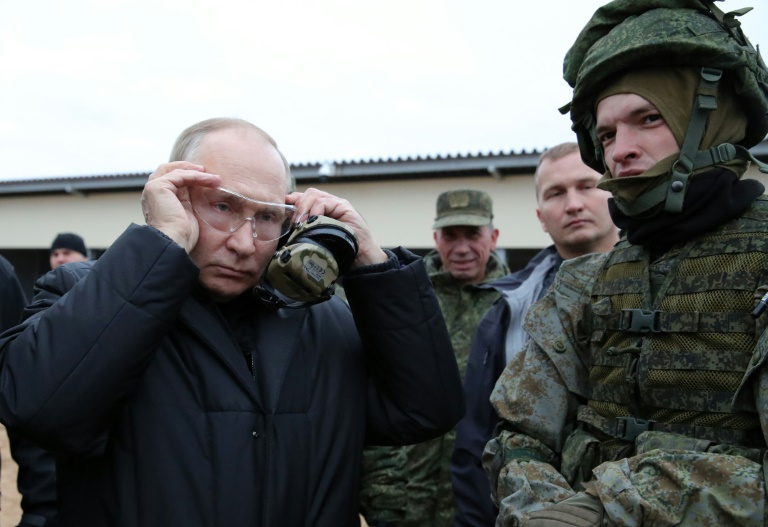World entering ‘most dangerous’ decade, warns Putin

‘The historical period of undivided dominance of the West in world affairs is coming to an end,’ said Putin
Moscow – The world is probably entering the “most dangerous” decade since the end of World War II, Russian President Vladimir Putin warned Thursday, presenting the Ukraine conflict as part of a wider struggle against western domination.
Arguing that Western dominance in global affairs was coming to an end, Putin insisted Russia was not just challenging the West but fighting for its own right to exist.
Putin was speaking as Ukrainian troops reclaim more territory that Moscow has annexed as its own, and has mobilised more troops to defend.
“Ahead is probably the most dangerous, unpredictable and at the same time important decade since the end of the Second World War,” Putin told members of the annual Valdai Discussion Club, in a lengthy question-and-answer session.
The situation was “to a certain extent revolutionary”, he said, describing the Ukraine offensive as simply part of the “tectonic shifts of the entire world order”.
“The historical period of undivided dominance of the West in world affairs is coming to an end,” said Putin. “The unipolar world is becoming a thing of the past.
While the West was still “desperately” trying to govern humanity, it was not able to. “Most peoples of the world no longer want to put up with it,” he said.
And the Russian president characterised the current crisis as a battle for survival for Russia.
“Russia is not challenging the elites of the West, Russia is just trying to defend its right to exist,” he said.
– ‘Dirty bomb’ row –
Putin also returned to the row over Russian allegations that Ukraine was preparing to use a “dirty bomb” against its soldiers.
Kyiv was “doing everything to cover up traces of this preparation” for such a bomb, he said.
On Monday, the International Atomic Energy Agency (IAEA), responding to the allegations, said it regularly visited two sites that Moscow had raised questions over.
The UN agency’s inspectors had found nothing untoward and were preparing to visit again in the coming days, the statement added.
“We are in favour,” said Putin. “And it should be done as fast as possible.”
A dirty bomb is a conventional bomb laced with radioactive, biological or chemical materials which are disseminated in an explosion.
Over the past week, Russian Defence Minister Sergei Shoigu has repeated the claims regarding a Ukrainian dirty bomb in conversations with his counterparts in France, the US, the UK, China and India.
France, the US and the UK have all rejected the claim, and NATO chief Jens Stoltenberg has warned that Russia might be trying to use the claim as a “pretext” for escalation.
Kyiv meanwhile, has said it suspects Russia might itself use a dirty bomb in a “false flag” attack.
But Putin said Thursday using nuclear weapons in Ukraine would “make no sense at all to us — either in political or military terms”.
– Stalled talks –
Earlier Thursday, the Kremlin said Ukraine had pulled out of peace talks with Moscow back in March on orders from Washington.
“The text was ready… And then suddenly the Ukrainian side went off the radar, the Ukrainian side declared its unwillingness to continue negotiations,” Kremlin spokesman Dmitry Peskov told reporters.
Talks between Kyiv and Moscow have stalled since March, each side blaming the other for the stalemate.
Zelensky on Wednesday dismissed any possibility of talks with Moscow, denouncing Putin’s “planned rhetoric”. In late September, he said he would not negotiate with Russia as long as Putin was president.
Russia’s “special operation” in Ukraine has met with repeated setbacks.
Putin has in recent weeks changed his military commander there after Kyiv’s forces launched a counter-offensive, recapturing territory in the east.
Last week, Putin introduced martial law in four Ukrainian regions that he has declared annexed: Kherson, Zaporizhzhia, Donetsk and Lugansk.
The annexation announcement came in late September, despite Moscow’s forces not controlling some of the regions fully. Most recently, for example, there has been fierce fighting in the eastern region of Donetsk.
Russian-installed authorities in Ukraine’s occupied region of Zaporizhzhia on Thursday ordered phone checks on local residents.
Anyone subscribed to “propaganda resources of the terrorist Kyiv regime” would receive a warning, before being fined.
